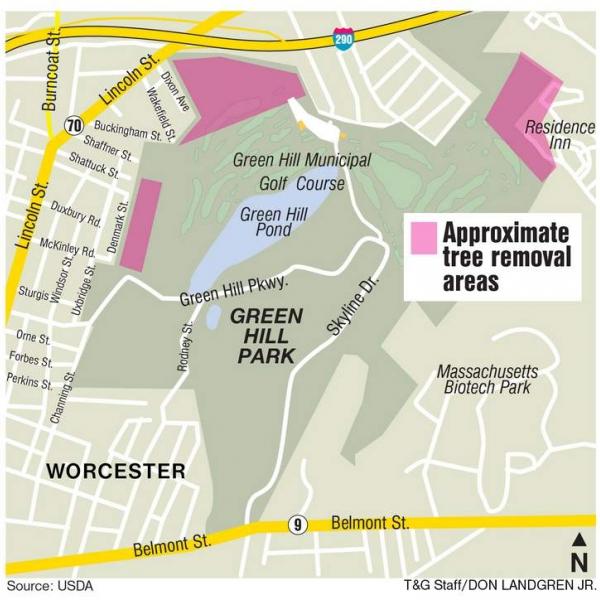
News Source
WORCESTER — City Councilors Tuesday tried to find another way to deal with an infestation of Asian longhorned beetles in and around Green Hill Park.
The Massachusetts Asian Longhorned Beetle Cooperative Eradication Program, led by the U.S. Department of Agriculture and the state Department of Conservation and Recreation, is removing about 200 infested trees discovered in the northern and eastern sections of the 455-acre park.
The cooperative also wants to perform a full host removal in the infested areas, which means removing trees that might not be infested but are a target of the invasive species, which was first discovered in the city in 2008 in the Kendrick Field area. The beetle is believed to have arrived in shipping crates from China, and officials have said the beetle was probably in the city several years before it was discovered.
Ryan Vazquez, the U.S. Department of Agriculture's acting project manager for the cooperative, didn't have an exact number of how many trees would come out of the park in the course of a full host removal, but agreed that it could number in the thousands.
Several city councilors balked at allowing the full host removal, saying that perhaps a more surgical approach involving chemical treatments and more intense monitoring could save trees in the sprawling park.
The state-federal cooperative has the authority to remove infested trees within the 110-square-mile quarantine area that includes the entire city and some or all of several surrounding towns. But it is more flexible with property owners when it comes to host tree removal, and councilors hoped to take advantage of that flexibility Tuesday night. District 1 Councilor Tony Economou proposed a motion to remove the infested trees in the Green Hill Park area, chemically treat the host trees, and closely monitor the hosts for the next few years.
Mr. Vazquez cautioned that host removal provides much more assurance that the beetle will not return. Not removing all the host trees and then later finding out that the beetle was simply not detected in some of them could have the city right back where it is today. Mr. Vazquez said the surveying efforts that have looked at more than 5 million trees in the area since 2008 have an accuracy of anywhere from 30 to 70 percent.
City Manager Edward M. Augustus Jr. pointed out that the city is in fact right back where it is today because of that strategy. In 2009, a few dozen infested trees were removed from Green Hill Park, without the accompanying host removal.
"The strategy that's suggested now is the strategy we used that didn't work," Mr. Augustus said. "It created this additional hot spot."
District 2 Councilor Philip Palmieri proposed the creation of a sort of appeals process for property owners facing removals. He said the city hasn't seen enough progress in the past eight years, and said if the full host removal goes through, surrounding neighborhoods could experience serious problems with water runoff.
Paul Moosey, the city director of Public Works and Parks, said the removal is targeted for three areas: near Dixon Avenue, in the area of the Lincoln Street Interstate 290 ramps, and the wooded area across from homes on Denmark Street. He said chemical treatments are indeed planned, but for trees within the park proper. He said erosion control plans will be submitted, but said it is only tree removal, not ground disturbance, so runoff might not be as much of a concern.
Earlier in the meeting, Colin M.J. Novick, executive director of the Greater Worcester Land Trust, argued that deforestation doesn't necessarily mean the destruction of a piece of land, and said the city needs to take seriously its responsibility to prevent the spread of the beetle to the vast maple forests of the Northeast.
Mr. Novick said it's hard to watch a forest come down, and said six years ago, the trust's Bovenzi property was deforested after beetles were discovered.
The forest has come back on its own, Mr. Novick said, and he invited neighbors of Green Hill Park to go on a tour to see what Bovenzi looks like today.
Mr. Economou agreed that the beetle should be eradicated, but said residents' property and lives have been impacted by the effort, too. He said other cities have handled infestations in a less invasive way.
Ultimately the council ordered Mr. Augustus to produce reports outlining what it would take — and what it would cost — for the city to go its own way and opt to treat the host trees in Green Hill Park rather than remove them. But the city manager said the council should be careful of unintended consequences as it proceeds.
"A lot of suffering in other neighborhoods would be for naught if we had a reversal," Mr. Augustus said.